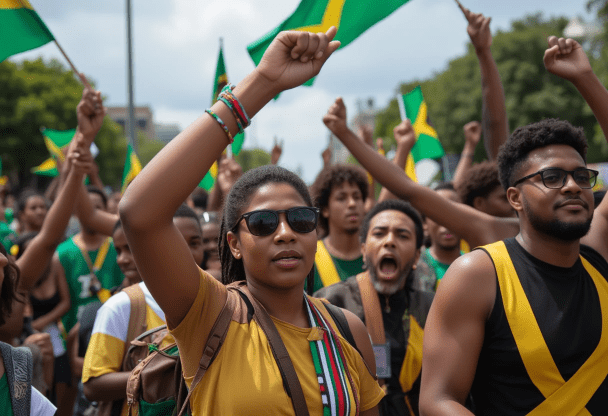How Jamaica Contributed to Global Black Liberation Movements

You ever wonder how a tiny island that you can’t even find on a globe without squinting managed to inspire global Black power movements? I mean, Jamaica is so small that if it sneeze, the Caribbean catch a cold. But somehow, this rock has produced world-changers, freedom fighters, and revolutionary vibes that ripple across continents.
Let’s talk about how likkle but tallawah wasn’t just a catchy Tourism slogan — it was prophecy. From fire bun speeches to spiritual resistance, from reggae rhythms to Rastafari royalty, Jamaica has been in the front row and sometimes on stage of Black liberation history. And we never needed a visa fi do it either.
1. Marcus Garvey – The Original “Big Man Ting”
You can’t talk global Black freedom without starting with di original big man, Marcus Mosiah Garvey. Born in St. Ann’s Bay; yes, same place where tourists go to zipline and forget they still owe student loan. Garvey wasn’t just preaching about self-reliance. He practically invented it.
Garvey told Black people all over the world to “look to Africa, when a Black king shall be crowned”, sparking movements in the U.S., UK, Africa, and beyond. His UNIA (Universal Negro Improvement Association) was basically the pre-Instagram version of a global movement, minus the hashtags.
And let’s not forget Garvey didn’t whisper. He chat loud-loud, stepping out in military-style suits, raising Black pride before it was marketable. Man was di real-top boss, long before “CEO” was trendy.
2. Reggae – The Soundtrack to Resistance
Look, if you’ve ever heard Bob Marley’s “Get Up, Stand Up” and didn’t feel at least a likkle revolutionary itch, check yuh pulse. Reggae music was Jamaica’s megaphone to the world, singing songs of struggle, oppression, hope, and bun Babylon.
Artists like Peter Tosh weren’t just musicians. They were walking, talking, guitar-slinging protests. Tosh once walked on stage with a giant spliff and shouted,
“Legalize it!”
That’s not performance art…that’s testifyin’.
Jamaican reggae became the heartbeat of liberation movements in Africa, Latin America, and even Asia. South Africans fighting apartheid? Bob Marley was right there on their playlist. Zimbabwean independence in 1980? Bob sang at the celebration.
And in case you forgot…he was barefoot.
Mi seh, di man nuh even need shoes fi mash up Babylon.
3. Rastafari – More Than Just Dreadlocks and Ital Stew
Rastafari might be misunderstood by the masses as just a “rootsy lifestyle” with plenty of herbs and red, green, and gold. But don’t get it twisted, Rasta was, and still is, full-blown resistance inna di purest form.
Rastas rejected the system, Babylon, as they call it and embraced African identity, repatriation, and spiritual defiance long before it was cool. While the rest of the world was bleaching to fit in, Rastas were chanting,
“Black is beautiful, man!”
while stirring cornmeal porridge wid coconut milk.
And let’s be honest, the dreadlocks alone were a statement. Rastas wore their faith on their head, even when society tried to dismiss them as mad or criminal. But guess what? Rasta philosophy inspired global Black identity and Pan-African pride from Kingston to Kinshasa.
4. Jamaican Slaves – Di First Bun Babylon Crew
Let’s roll it back — way before Garvey and Rasta, enslaved Jamaicans were already setting the tone for rebellion. Think Tacky’s War (1760), Sam Sharpe’s Baptist War (1831), and the many Maroon revolts before that.
We weren’t just waiting on massa to loosen the chains, we were brukking them off an’ dashin dem inna bush.
These resistance movements in Jamaica inspired slave uprisings in other colonies. Don’t sleep on Sam Sharpe. He had a whole nationwide revolt plan running before TikTok could’ve helped him trend. And guess what? That rebellion pressured the British government to accelerate abolition.
So yes, Jamaicans were bun fire pon slavery long before emancipation came knocking with its slow paperwork.
5. Influence on Civil Rights Movements – Big Up, Jamaica
Garvey’s ideas laid the groundwork for leaders like Malcolm X, Kwame Nkrumah, and even Martin Luther King Jr., who once visited Jamaica and wrote about the spiritual energy he felt there.
Garveyism was the seed and Black consciousness all over di globe was the harvest.
Jamaican thinkers, writers, and musicians kept pouring cultural seasoning into liberation pots worldwide. Our accent alone is enough to make injustice feel nervous.
Let’s be real. Jamaica never needed size to make an impact. We’ve always known how to mek big noise inna small package.
So next time someone side-eyes our “brawta attitude” or says we act too proud for such a small country, remind them:
Jamaica didn’t just free itself. It helped free minds across the diaspora.
Wi nuh boast — wi just well aware seh wi culture strong.
Liberation isn’t just in our history. It’s in our vibes, our voices, our verses. From “backra massa” days to reggae riddims and Rasta man chants, Jamaica has always said one thing loud and clear:
“Wi nah tek no chat.”
And honestly? The world is better for it.



